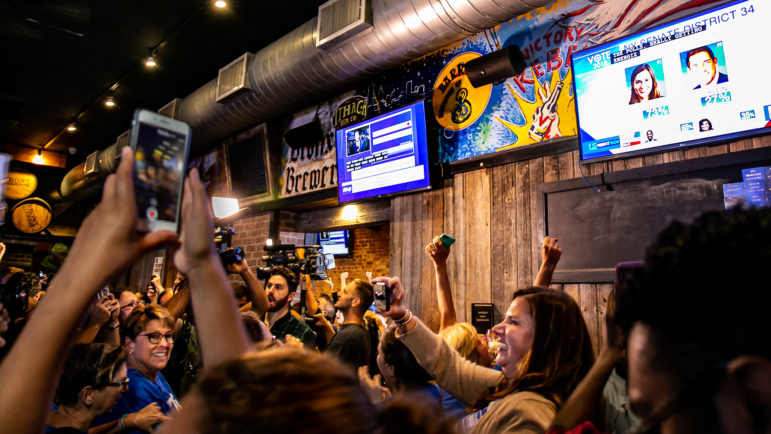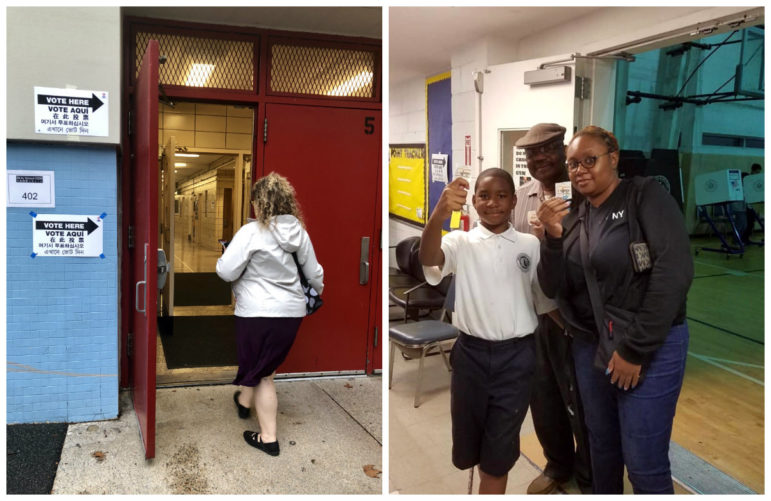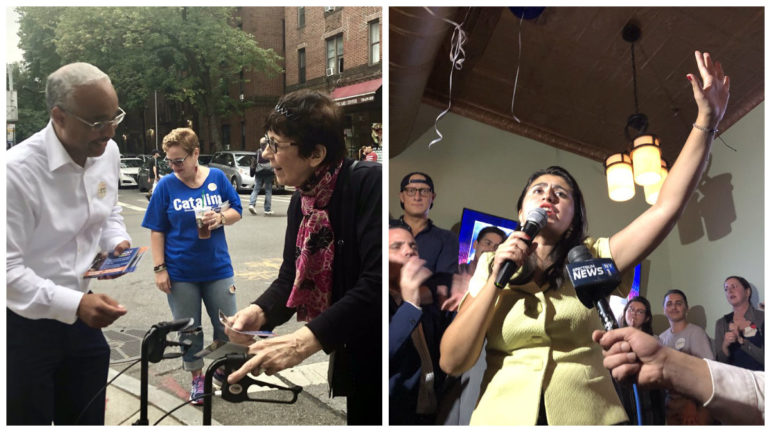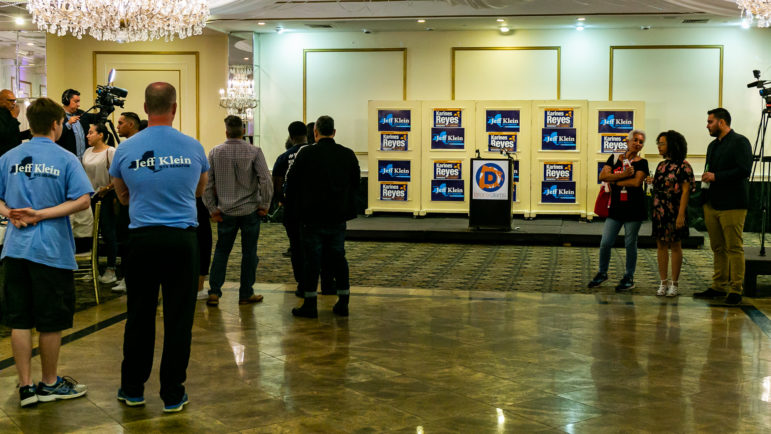
Adi Talwar
Supporters of challenger Alessandra Biaggi react to her being declared the winner in her primary race against former IDC leader Sen. Jeffrey Klein.
This story was produced by graduates of the City Limits Accountability Reporting Initiative For Youth (CLARIFY), City Limits’ paid training program for aspiring public-interest journalists, and by students enrolled in the journalism program at CUNY’s Lehman College.
New Yorkers headed to the polls Thursday in the state’s primary election, which saw Gov. Andrew Cuomo comfortably win against actress and first-time candidate Cynthia Nixon, while several incumbent state senators affiliated with the now-defunct Independent Democratic Conference were bested by challengers.
While voter turnout in New York’s primaries has been historically poor, CBS News reports that the number of ballots cast Thursday was double what it was during the 2014 election. City Limits spoke to voters at polling sites across the boroughs, many of whom said they were motivated to vote this year by Trump’s 2016 win and what’s happening in Washington.
“People realize now, especially from the presidential election, that their voice means something,” said Daniel Guareno, 22, who cast his vote for Cynthia Nixon at P.S. 96 in the Bronx Thursday. “I feel good being a small push towards bigger changes.”
Nicole Kelly, a 29-year-old Kew Gardens resident, said President Trump was the number one reason she voted.
“I think he’s motivating a lot of people. I think this is my first primary, I don’t think I’ve ever voted in a primary before,” she said. “When you feel the effects in real life, you’ve got to.”
Annette Daniec, 55, of Flushing, said Trump’s presidency is “absolutely” part of what drove her to vote in the primary.
“I think anybody who isn’t happy with him should be out voting,” she said.
Joel Lee, 19, voted at Jacqueline Kennedy Onassis High School in midtown Manhattan, saying the act was “the most important thing I did today.”
By Thursday evening, in the final hours before polls closed, a line of people were still waiting to cast ballots outside P.S. 8 in Bedford Park, where workers said turnout had been high all day.
“This is the best turn out for a primary election that I’ve seen in years,” said Tony Carter, a Bronx resident who’s been working with the New York City Board of Elections for nine years.
Other locations were less hopping. Jacqueline Donnenfeld, a poll site coordinator at P.S. 150 in Sunnyside, Queens, said the crowd was smaller than last year.
“This year I think the rain and upcoming hurricane affected people from coming,” she said.
Here’s more of what we heard from the city’s voters on Thursday.

Jeanmarie Evelly, Lia Garot
At left, a voter heads into a polling site at P.S. 17 in Astoria. At right, John Adam poses with his two grandchildren after voting in midtown Manhattan.
Nixon’s inexperience drove voters to Cuomo
In the Democratic race for governor, a number of voters told City Limits they cast ballots for Cuomo because they think his time in office makes him a better fit for the job than Nixon, an activist and former actress.
“Cuomo’s been around a long time,” said Hillary Gregg, who cast his ballot for the incumbent in Jackson Heights. “I’ve got nothing against the woman [Nixon.] I’m just familiar with Cuomo.”
Mary Green, a 54-year-old school aid who voted at IS 217 in the Bronx, echoed this.
“He reminds me of his dad, and I’ve been voting for his dad forever,” she said.
Allan Poretsky, an accountant who voted in Co-op City, said he chose Cuomo because Nixon’s a political newbie.
“I don’t think Cynthia Nixon has any experience compared to Mario’s son,” the 60-year-old said. “She doesn’t really have any track history. She’s just getting into politics now it seems.”
Omar Allen, 42, offered a similar reason.
“I am here to vote for Cuomo. I do not personally like him or his ideas for change in New York, but at least he has experience within this line of work and I just don’t think Cynthia does,” the Bronx resident said. “I found out she was an actor before this that dabbled in education here and there, but can she really run this state?”
For others, though, it was Nixon’s position as a political outsider that earned her their support. Dana Acheson, 38, said she was inspired by the recent wave of progressive candidates, like Alexandria Ocasio-Cortez, looking to unseat longtime democratic incumbents.
“I learned a lot during this election about established democrats,” she said. “We need to start new.”

Jeanmarie Evelly
Left: State Sen. Jose Peralta, who represents the 13th District, greets voters in Jackson Heights on Primary Day. Right: Challenger Jessica Ramos gives a victory speech after defeating Peralta for the democratic nomination.
The IDC effect
While Cuomo cruised to the gubernatorial nomination, the primary saw six incumbent Democratic state senators in the city—five of them formerly affiliated with the Independent Democratic Conference, or IDC — lose their races to progressive challengers.
The IDC, a group of Democratic state senators who shared power with the senate Republicans for seven years, rejoined the mainline Democrats this past spring. But that reunification did little to curb the negative feelings many voters harbor for the former IDC, several residents told City Limits.
In the 34th State Senate District, which encompasses large portions of the Bronx and a small part of Westchester, former IDC leader Jeff Klein lost out to Alessandra Biaggi, a former Cuomo and Hillary Clinton staffer.
Valerie Babb, 46, said she was impressed by Biaggi, who personally knocked on her door to introduce herself during the campaign—something she’s never experienced before.
“I felt that there was a sort of honesty about her,” said Babb, who voted for Biaggi at P.S. 96 in Pelham Parkway. “That tells me that the tide of this neighborhood is changing, because elected officials are coming and knocking on your door to share a little bit about what’s going on and what they hope to accomplish.”
Raphael Schweizer, who volunteered for Biaggi’s campaign, said he was turned off by Klein’s failure to strengthen the state’s rent laws during his time in office.
“He didn’t fight for us,” he said. “We need a real democrat who isn’t obsessed with their ego so much that they will collude with republicans just to put themselves in power.”
Voters in Queens State Senate District 13—which includes Jackson Heights, Corona, East Elmhurst and parts of Astoria—expressed similar sentiments about incumbent Sen. Jose Peralta, who joined the IDC last year.
“One day he’s this, the next day he’s that,” said Gloria Valencia, a longtime New Yorker and Jackson Heights resident who said she voted for Peralta challenger Jessica Ramos.
Ramos, a former union organizer, beat Peralta for the democratic nomination with nearly 55 percent of votes in the district.
“I particularly dislike Peralta because of his association with the IDC,” said Ronald Stephenson, 56, who said he felt that the IDC was more focused on power than representing its constituents. He voted for Ramos at his local polling site in Jackson Heights. “I’m willing to take a chance on somebody like her. I already know Peralta.”
Besides Klein and Peralta, former IDC members Marisol Alcantara in Manhattan, Jesse Hamilton in Brooklyn and Tony Avella in Queens lost their races to former Councilmember Robert Jackson, Zellnor Myrie and former Comptroller John Liu, respectively. Diane Savino, a founding IDC member, was easily re-elected in a district anchored on the north shore of Staten Island. Upstate, the two other former IDC members—David Carlucci and David Valesky—faced challenges; Carlucci survived but Valesky did not.
In other notable State Senate races, Blake Morris fell well short of unseating Simcha Felder, a Democrat whose decision throughout his Senate career to caucus with Republicans has ensure GOP control of that body, and Julia Salazar prevailed over incumbent Martin Dilan despite weeks of stories about inconsistencies and apparent fabrications in her description of her background. Dilan was a major recipient of real-estate donations, reportedly failing to disclose thousands of dollars in that money.
No one was elected on Thursday: The general election is November 6. One of those general matchups is set: Andrew Gounardes beat Ross Barkan for the Democratic nomination to challenge incumbent Republican Sen. Marty Golden for his Brooklyn seat in November.

Adi Talwar
Supporters of Sen. Jeff Klein watch as election returns indicated his defeat was likely.
Shifting moods in Brooklyn
In Brooklyn’s District 20, which covers Brownsville, Crown Heights, Gowanus, Park Slope, Prospect Heights, Prospect Lefferts Gardens through South Slope and into Sunset Park, newcomer Zellnor Myrie defeated incumbent Hamilton, who was first elected in 2014 and joined the IDC just before Election Day in 2016. Preliminary results showed Myrie with 22,603 votes or 54.1 percent to Hamilton with 19,138 votes or 45.9 percent. According to the state Board of Elections, there are 136,129 active enrolled Democrats in District 20.
On primary election night, both candidates’ headquarters were still making calls until the last moment. Then the numbers started coming in from the polls. At Hamilton’s headquarters, the early numbers rose in his favor and excitement grew, but as the tide turned and Myrie’s edge began to climb, Hamilton campaigners became quiet and started packing up for the night. Some asked about the poll numbers from time to time while other volunteers listened to the movements of Hurricane Florence heading for South and North Carolina on AM radio. Myrie’s campaign headquarters in Sunset Park was abuzz with volunteers hugging each other.
Both candidates criticized each other throughout the campaign. Myrie focused on Hamilton’s accepting real-estate industry campaign donations and his former affiliation with the IDC, while Hamilton’s backers depicted Myrie as a candidate of gentrifiers who was inexperienced in politics.
Across polling sites the major issues — housing, education, transit and mass incarceration — stood out in interview with voters.
“I have moved out of so many apartments over the last several years,” said Nick Glastonbury while he stood on McKeever Place. “Six! Six in the last nine years. It totally destroys the fabric of the neighborhood. I can’t stay in one place and invest in a community.”
Glastonbury, a 27-year old teacher, said education and transit were additional important issues for him. “It’s an absolute nightmare trying to get anywhere.”
Residents who have lived in the area for decades like John Kennedy, a 30-year resident, said affordable housing, displacement in communities of color and public education were important issues for him. The housing being created in the district, he said, “is not for folks like me—it’s for the upper class.” Kennedy added: “I may be an old white man but I do not want an all-white neighborhood. Despite what Trump thinks—diversity is important. Every generation needs to have a good education and teachers should be able to have livable wages. The wealthy corporations get all the tax breaks in the world and our education system is left with nothing. We can’t ignore that.”
Another resident voted despite being cynical about issues ever getting resolved in his Crown Heights neighborhood. “I am just doing my civic duty. They say they are going to work on it and waste another ten years. The police still harass us and all these houses they are building up are supposed to be low income, especially the new ones. How is $2,000 rent for a one bedroom affordable?,” asked Sam Johnson Jr., who has lived near Rogers Avenue for 54 years. “It seems like they are trying to push black folks out of this neighborhood. I am the pillar of this community—not them.”

Adi Talwar
Supporters awaiting primary night remarks by Sen. Klein.









One thought on “The People Behind the Numbers on Primary Day”
Pingback: Articles at Internships – Deanna Garcia